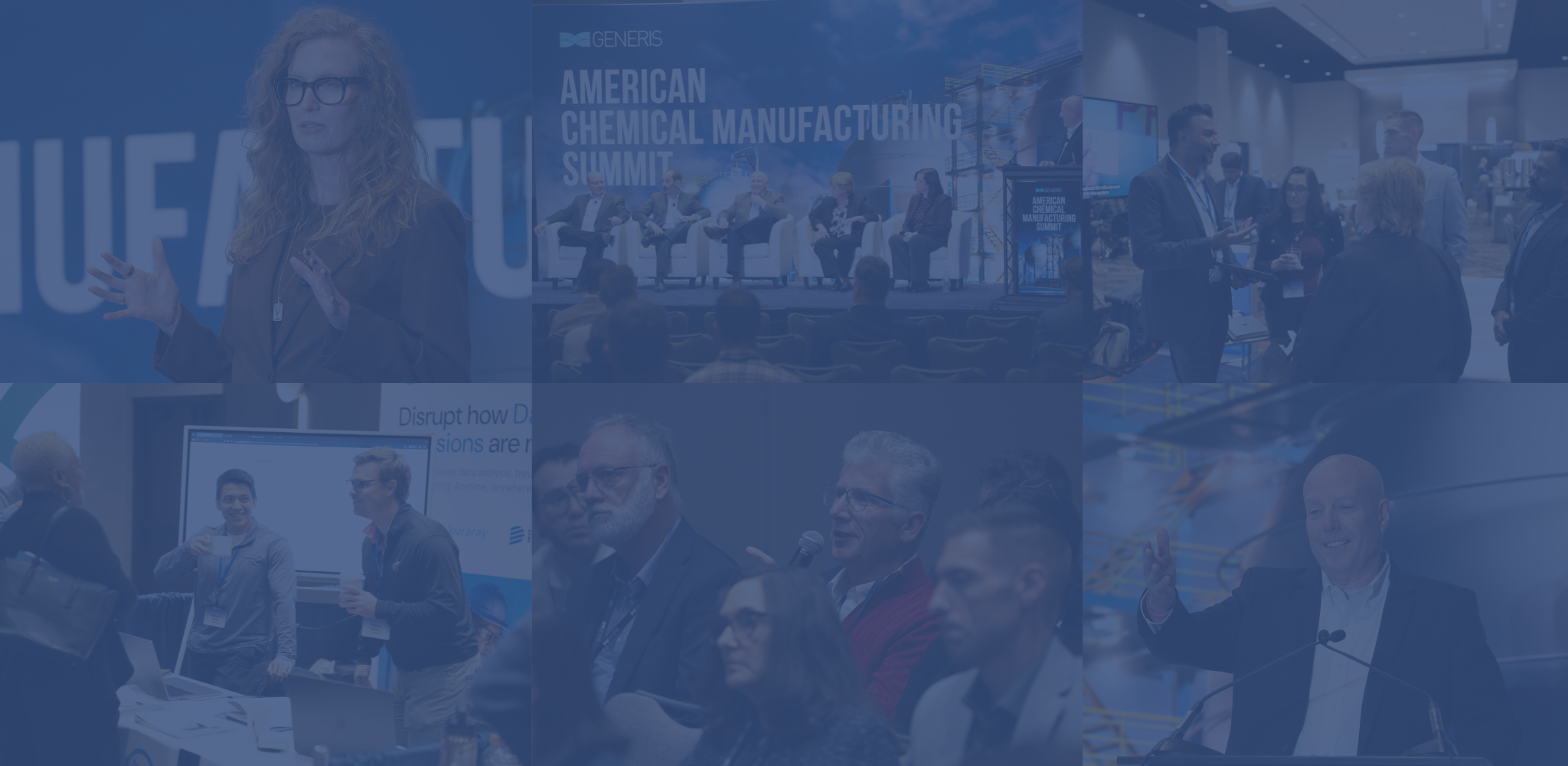"Being part of an industry that's really positively affecting billions of people's lives across the globe—I mean, how can you not like that?"
In the world of biomanufacturing—where the goal is to create medicines that will help cure people of their ailments—quality is one of the most important everyday driving factors of excellence.
As advancements in biotechnology continue to redefine the possibilities within the industry, the assurance of product quality remains non-negotiable. From life-saving medications to groundbreaking therapies, every aspect of biomanufacturing demands meticulous attention to detail and adherence to firm standards.
To dive further into this, we spoke to Scott Goodberlet, VP and Head, Quality Americas Region and Device Quality, at AstraZeneca. Scott oversees the majority of AstraZeneca’s quality initiatives and has over 20 years of experience in the industry.
Read below to uncover how Scott views quality in the biotech industry, his advice on the most important aspects of organizational quality, and how he successfully incorporates quality in AstraZeneca’s daily operations.
Thank you, Scott, for meeting with us. Could you begin with a brief introduction about yourself and your responsibilities in your current position?

I'm currently the Head of Quality for the Americas’ supply region for AstraZeneca. AstraZeneca is one of the largest global biopharmaceutical companies and our medicines are used by millions of patients around the world. I also am responsible globally for device quality. So in my role for the supply side, I have manufacturing sites in North and South America, primarily in the small molecule space and primarily solid dose, although some API and functional excipients as well. As far as device quality goes, that's a global role. It's both in large and small molecules, and the devices that are related to new products as well as on-market products.
As the VP of Quality at AstraZeneca, what are your favorite aspects of the role? What do you find most rewarding about your position?
One of my favorite aspects of the role is how truly important it is.
Sometimes, I like to sit back and think about how exciting it is—especially these days. I think we're going to see this at the American Biomanufacturing Summit, but we're truly speeding up the advances in quality.
Being part of an industry that's really positively affecting billions of people's lives across the globe—I mean, how can you not like that? So congratulations to everybody that's joining the Summit, because sometimes you have to sit back and remember what you're doing it all for.
As my day-to-day goes, it's truly the interpersonal actions and conversations that I have with people, especially as I get further into my career. You know, it's more about influencing the next generation and helping them make connections to grow their capability. It is really something special when you make one of those connections and get to see someone grow. Sometimes, they may even leap and take something that you thought of to the next level.
I’ve always liked analogies, but when I speak to people who are becoming people managers for the first time, they tend to be very highly capable individuals, or individual contributors. They don't always understand the power of an organization.
And I've said, that if you have 10 people in your organization, you can be 100% effective by yourself, but if you can influence them to be 5% more effective, you've duplicated yourself. 10% you're even better. So the more you can influence, drive, coach, and mentor across the organization are the areas that really excite me as part of my role.
On the topic of your session “Advancing Proactive Quality Operations and Nurturing a Culture of Excellence,” can you share a little about how you inspire teams to prioritize quality and foster a culture of excellence?
Just so you know, this is a challenging question, right? There are so many things we do with investments and other things, but I think first and foremost to inspire and nurture that quality excellence is really to focus on why we're here, the patient.
I have found that the best conversations we have are when we understand and start with the end customer in mind; the patient who's taking our medication. So if you want to inspire, there's nothing better than saying, you're making medicine that your children could take, that your parents could take, that your spouse could take. I think especially in the quality world, we're always thinking of the ramifications of our decisions. That's probably the best way to start. 
As long as you nurture that “doing the right thing" value, I think you'll end up with very good outcomes. So that's a start.
Aside from things like capital investments to drive improvements in quality performance, simplification is an area that we need to focus on as an industry. And quality, especially legacy quality, isn't necessarily the best at simplification. We tend to add complexity. We'll have a deviation and we'll come up with a kappa and we'll change the procedure. That's complexity, right? So an operator that's on the floor, or a scientist in the labs who was trained on one procedure now has a procedure changed. Some procedures change quite frequently because they're major procedures. We add complexity to this situation. I think if we can get to a point where we take a step back, and understand what a true kappa is, and what the true root cause is, we can really start to drive simplification.
It's interesting; we recently came out of a pandemic when nobody knew what was going to happen the next day. When we became hyper-focused on what the people who do the important things every day required to be successful, all our performance metrics improved. We took away all the projects to improve their performance and just focused on what they needed, and things improved. If we can simplify, get back to the basics, and drive the appropriate investment, that’s really where you’re going to nurture a good quality performance and culture of excellence.
The last thing I’ll say—and we’ll probably talk more on this because it's a hot-button issue for me now—is that as an industry we have lots of activity and projects to improve things. Some people call it operational excellence, or Lean Six Sigma approaches. We tend to drive activities that become counterintuitive to what we're trying to focus on. We should be focused on making the quality product available for our patients at the right cost at the right time. Sometimes even those programs that are set up to do that, start to drive things that are more, “Hey we have to be good at Lean Six Sigma.” No, we have to be good at making products. Lean Six Sigma should enable us to be better at making products. So I think as long as we keep that simplification in mind and drive to what we're really trying to deliver, we can drive the culture of excellence.
How do internal quality culture and excellence compare in the biopharma industry, versus other industries?
Again, I want to thank everybody who is listening or reading this interview and will be attending the American Biomanufacturing Summit. What we do is really important.
We are in a heavily regulated industry. We started looking at how other industries approach quality, and we’ve been focusing primarily on those that are even more highly regulated than ours (like aerospace). It’s interesting that when we’ve talked to these companies that have done their own benchmarking, they actually show that the companies that are outside (in other words, less heavily regulated, and have slimmer margins where failure can actually lead to real problems on the business side) tend to be more proactive in driving that activity. So, I think we can ultimately learn some things from how these organizations drive quality.
Overall, the quality organizations in pharma are obviously very good and more patient-focused. However, we tend to be too reactive, and one of the things I will be speaking about is the proactive aspects, which is really just risk management. As opposed to managing a deviation - which we are all good at - we recognize the hard effort we have to do when events happen. How do we reward the individual that prevents something from happening? So we are really looking to try and drive in this space.
In AstraZeneca, we are trying to get ahead of issues to eliminate them before they can happen. I talk about Lean Six Sigma - Lean Six Sigma is quality. It’s about understanding your risks, about trying to get out there and simplify and drive things right the first time. The two programs are in essence synonymous. Sometimes they get more focused on productivity, and we get more focused on compliance, but I think if we focused more on getting quality right the first time, we’d be in a much better place.
"There are so many things we do with investments and other things, but I think first and foremost to inspire and nurture that quality excellence is really to focus on why we're here, the patient."
What is the most important aspect of maintaining a culture of quality and excellence? What are some things an organization absolutely must do to ensure they excel at internal quality?
There’s a lot I can say here.
There's a constant message that needs to be sent in the quality space. You get what you measure. If you’re not measuring quality and you’re taking it for granted, that message can really be amplified to the people a level down, two levels down, or on the shop floor where it's arguably most important. We have to make sure the patient is present, that's really the focus of quality (to make sure we are taking care of the patient). If we stay in that vein, we can focus on quality in all the messages we do.
.jpg?width=392&height=262&name=American%20Biomanufacturing%20Summit%20(4).jpg) Productivity, safety, and maintaining our businesses are very important. But I think we all have the same vision.
Productivity, safety, and maintaining our businesses are very important. But I think we all have the same vision.
You know, I like my stories.
One time I was working with a Quality Manager and he was frustrated with Operations. And I stopped him at one point and I said if you were walking on the street and your friend was coming the other way and you were seeing him for the first time in 10 years, what would you tell him you did if you only had one sentence? And his answer was “I make quality medicines for patients.” And I said, “What do you think the production person would say? I think he would say he makes quality medicine for patients.” We all have the same job.
Sometimes we have a different perspective, or a different paradigm we’re driving to, but I think as long as we’re all aligned behind a common goal, we can get better outcomes. The quality team needs to understand the safety and supply, the supply team needs to understand the quality and the safety aspects.
We need to be aligned in driving the business forward to make it as simple as possible. Imagine a world where everything an operator does is right the first time, everything in a lab is done right the first time. The world becomes a very simple place, and I think that’s where our efforts need to be.
Can you share any recent initiatives or innovations AstraZeneca has implemented to enhance quality assurance practices?
One thing I love about AstraZeneca is our commitment to our license to operate. Making sure we’re doing the right thing, not only for our patients but to the expectations of our regulators. There’s a heavy capital investment in the company to make sure we have the right tools and that our equipment is maintained appropriately. We’re all moving into this digital space at warp speed, so it seems like warp speed is the name of the game these days.
There are so many changes happening, and so many areas where the digital space can drive, so staying on top of it is a big challenge, and also an incredible opportunity. This all comes back to simplification, which I addressed earlier. We’ve looked at how we can eliminate deviations in AstraZeneca to get back to that “right the first time all the way through the process” in operations, in the laboratory, and in the warehouse. The only way to do this is if we become better at risk management. I will argue that in all my years working in this industry in various companies, I have seen that we’re not all that good at risk management - and risk management is true quality. While we may spend most of our time working on minimizing the deviations because we have to, they are not really true quality.
The question becomes: how do we shift our organization from being reactive to deviations when they occur, to preventative and proactive so that deviations don’t happen in the first place?
We started a program here where we looked at where most of our deviations were coming from, and we found that most were from what we would have previously called “human error”. Human error as a root cause is not where we should end up. We have a corrective action that’s going to come out of these.
The problem is what to do when it's human error. Retrain? When an operator has done an action right 999 times and the 1000th time has an error, retraining is not the right option. The procedure’s not clear and we have to clarify the procedure? Again, if it works the first 999 times and there’s a mistake on the 1000th, it’s not the procedure, something happened. So again, we’ve invested in our human performance area to try and modify our quality organization, trying to use quality to spring this forward. So, when we get to one of these cases with one mistake, we can get into the mind of the operator.
You know I use this all the time, when a quality person goes to the floor, they investigate linearly. You did the activity and you didn’t sign the batch record, it’s a human error, and we should retrain. But, the operators do not live in a linear world, they're in a multivariable world. They're on a line with two or three other people and there's an alarm going off, or there's a meeting going on over here, and there's a lot of distractions. This is a very simple example, but we need to get into a true understanding of where the failure occurred if it's originally determined a human error, and I think what you'll find is there's distraction. How can we help prevent that distraction when you know there's something else that's occurred? “Hey, the process isn't ideal.” It's Herculean that for 999 times you did it right and one time you did it wrong.
Ultimately, I think there's an empathy that we need to have in the quality organization to start building that culture. We were very specific on the human performance because what we felt was if quality came down, and it was seen as helping as opposed to blaming, we would start to fall into the speak-up culture. I think the speak-up culture is one of the most important things in driving quality. If people aren't speaking up, how do we know what the problems are? But if quality comes down and they're always there to blame, why wouldn’t you speak up? 
Looking at it as, “You did it 999 times right, how can we help make sure this never happens again?” I think that starts to change the dynamic. That’s a small reuter on a big ship, to start to change the culture in this proactive space. We started that in the first year where the intention then moved to events-learning activities (human performance events learning), which is risk management. We have quality teams on the floor in every shift, asking “Hey, where are you worried that the next deviation is coming from? What concerns you?” So that we can have a deep dive into that area, and an events-learning analysis to potentially determine corrective actions. They could be just-do-its or quick wins. Or, they might be more significant and require change control. But how can we help, so that continues that change from the reactive to the proactive, and we can start to eliminate issues before they happen? The people who know what is going to go wrong are the people who are on the floor and live it every day.
It’s not rocket science, it's not particularly hard. What is hard is keeping the focus on it in an organization that's running very fast. We don't have hundreds of people out there that can do the proactive piece. But I do believe if we spend a little bit more time on that proactive piece and start to change the ship of the way the typical pharmaceutical industry works, how organizations work, I think we're really going to unlock the potential of our teams and drive all of the above. As I mentioned, we’ll be safer because we will not only be eliminating quality events but also eliminating safety concerns. Our suppliers will be happy because it'll be done right the first time and there will be less disruption to supply.
It really is the lean approach - and what we're trying to do in our quality organization right now is to drive that proactive turn. We're in the early days of it, and some of my sites are leading the way on this. I'm very proud of the work that they're doing. Some sites have grabbed onto it, other sites don't quite have the secret sauce to understand how to get them to buy into it yet, but we're getting there.
Again, this is a culture change. This isn't a project, this is something we are changing. We're going to start with human performance, and then we'll go into method, and then we'll go into process and environment and other areas. There's some of that happening already, but we think this really has potential. But, we have to stick with it. It's not a one-year thing, it's not a two-year thing, it's a five-year thing to get to a baseline and then continuous improvements moving forward.
"We need to be aligned in driving the business forward to make it as simple as possible. Imagine a world where everything an operator does is right the first time, everything in a lab is done right the first time. The world becomes a very simple place, and I think that’s where our efforts need to be."
We wanted to thank Scott for offering his time to share his insights and knowledge with us. Quality is a crucial part of every organization, and we believe everyone has something to learn from his experiences.
If you want to hear more from Scott, join us at the 10th Annual American Biomanufacturing Summit. Scott will be leading a session titled “Advancing Proactive Quality Operations and Nurturing a Culture of Excellence,” and we look forward to hearing from him! You can learn more about AstraZeneca’s global operations, manufacturing and supply here.
-------------------------------------------------------------------------------------------------------------------------------------------------------------------------------------------------------------
If you enjoyed this content, subscribe so you never miss a blog!
%20(1).png?width=773&height=112&name=Generis%20Logo%20full%20Colour%20(Large)%20(1).png)

.png)
-2.png)
